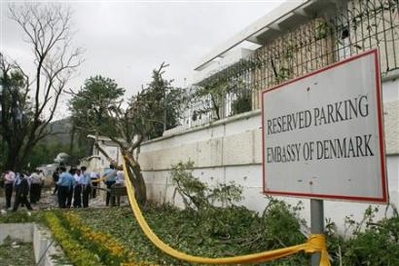
Pakistani police examine the site of a bomb blast outside the Danish embassy in Islamabad June 2, 2008. [Agencies]
Pakistan's government, in office for just two months, has been pursuing peace deals with the militants, a shift away from the US-backed military tactics employed by President Pervez Musharraf.
The US has expressed concern the deals will give militant groups time to regroup and plan more attacks, and Monday's blast could lead the West to push Pakistan to rely more on military operations against extremists.
Pakistani officials condemned the attack, but indicated they would keep up militant contacts. The government has insisted it is not talking to "terrorists" but rather militants willing to lay down their weapons.
"There is no question of any impact of this incident on the peace process, but of course it badly harmed our image in the world," said Rehman Malik, the Interior Ministry chief.
NATO says the deals have led to a spike in violence on Afghanistan's side of the border.
"If there are insurgencies in places that are not in Afghanistan but are very close by, and security forces are not taking them on, I don't think that bodes well for the whole region," Gen. Dan McNeill, outgoing commander of NATO forces in Afghanistan, said Monday.
Denmark faced threats at its embassies following the reprinting in February by about a dozen newspapers of a cartoon that depicted Muhammad wearing a bomb-shaped turban. That and other images in a Danish paper sparked riots in the Muslim world in 2006.